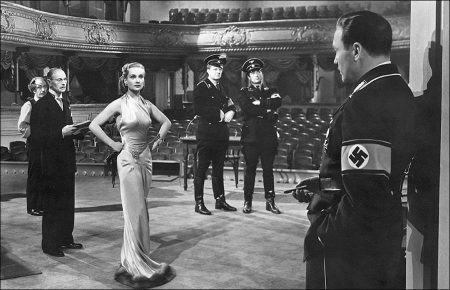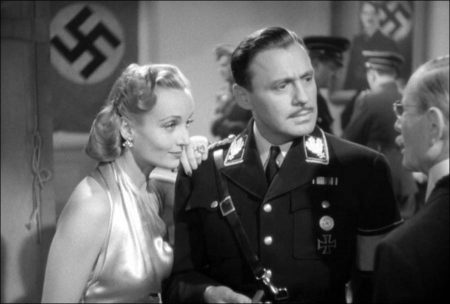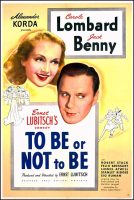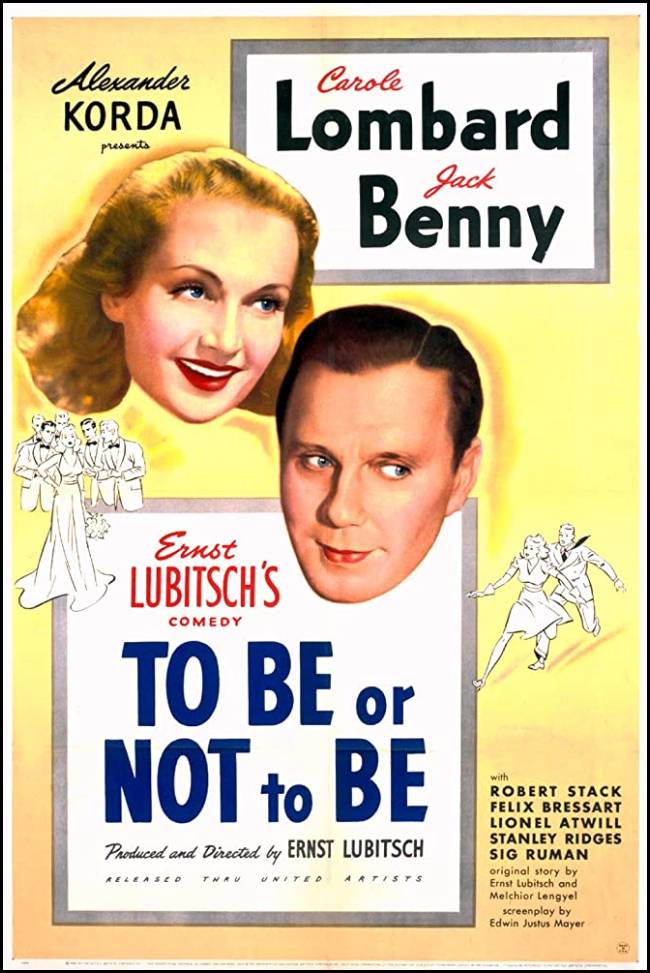To Be or Not to Be movie storyline. Joseph and Maria Tura (Jack Benny and Carole Lombard) operate and star in their own theater company in Warsaw. Maria has many admirers including a young lieutenant in the Polish air force, Stanislav Sobinski. When the Nazis invade Poland to start World War II, Sobinski and his colleagues flee to England while the Turas find themselves now having to operate under severe restrictions, including shelving a comical play they had written about Adolf Hitler.
In England meanwhile, Sobinski and his friends give Professor Siletski – who is about to return to Poland – the names and addresses of their closest relatives so the professor can carry messages for them. When it’s learned that Siletski is really a German spy, Sobinski parachutes into Poland and enlists the aid of the Turas and their fellow actors to get that list back.
To Be or Not to Be is a 1942 American black comedy film directed by Ernst Lubitsch and starring Carole Lombard, Jack Benny, Robert Stack, Felix Bressart, Lionel Atwill, Stanley Ridges and Sig Ruman. The plot concerns a troupe of actors in Nazi-occupied Warsaw who use their abilities at disguise and acting to fool the occupying troops.
It was adapted by Lubitsch and Edwin Justus Mayer from the story by Melchior Lengyel. The film was released one month after actress Carole Lombard was killed in an airplane crash. In 1996, it was selected for preservation in the United States National Film Registry by the Library of Congress as being “culturally, historically, or aesthetically significant.”
The title is a reference to the famous “To be, or not to be” soliloquy in William Shakespeare’s Hamlet.
About the Story
The setting is Warsaw, Poland, just before the 1939 Nazi Germany invasion. The well-known stars of a Warsaw theater company, “ham” actor Josef Tura (Jack Benny) and his beautiful wife, Maria (Carole Lombard), along with the rest of the company, are rehearsing “Gestapo”, a play satirizing the Nazis. One of the actors, Bronski (Tom Dugan), even proves that he can pass for Hitler in the street.
That night, when the company is performing Shakespeare’s Hamlet, with Tura in the title role, Bronski commiserates with friend and colleague, Greenberg (Felix Bressart), about being limited to being spear carriers. Greenberg, who is implicitly Jewish (although the words “Jew” or “Judaism” are never used), reveals he has always dreamed of playing Shylock in Merchant of Venice, especially the famous “Hath not a Jew eyes?” speech, which he proceeds to recite.
Meanwhile, the lovely Maria has received flowers from handsome young pilot Lt. Stanislav Sobinski (Robert Stack). She tells Sobinski to come to see her in her dressing room when Tura begins his “To be or not to be…” speech, to ensure privacy. As her husband, Tura begins his monologue, Sobinski very obviously walks out, causing the highly-strung actor great distress at the apparent insult. Shortly thereafter, the company is ordered by the government to cancel “Gestapo”, to avoid possibly worsening relations with Germany.
The following night, after a brief (and chaste) assignation, Sobinski again walks out during “To be or not to be”, freshly infuriating Tura. Sobinski confesses his love to Maria, assuming that she will leave her husband, as well as the stage, to be with him. Before Maria can correct Sobinski’s assumption, news breaks out that Germany has invaded Poland. Sobinski, a pilot, leaves to join the fight, and the actors huddle in the basement of the theater as Warsaw is bombed.
Hitler conquers Poland, but the Polish division of the British Royal Air Force is fighting to free its mother country. Lt. Sobinski and other young pilots of the division sing together, with the Polish resistance leader Professor Siletsky (Stanley Ridges) as their guest. Siletsky will return to Warsaw shortly, and the men give him messages for their loved ones. However, Sobinski becomes suspicious when Siletsky doesn’t know of the famous actress Maria Tura. Sobinski reports the incident, the Allies now realize that Siletsky has a list of the names and addresses of relatives of Polish airmen in the RAF, against whom reprisals can be taken.
Sobinski flies back to warn Maria, and she goes to pass on the message to the underground. However, Siletsky has returned as well, and has Maria brought to him by German soldiers. He invites Maria to dinner, hoping to recruit her as a spy, as well as to sample her charms. She plays along and returns home to dress for dinner, but just before she arrives home, Tura returns and finds Sobinski in his bed wearing his bathrobe. Maria and Sobinski try to figure out what to do about Siletsky, while Tura tries to figure out what is going on with his wife and the pilot. In the end, Tura proclaims that he will kill Siletsky.
Later that evening, Maria returns to Siletsky’s room and pretends to be attracted to him, but just as they kiss, there is a knock at the door. A member of the acting company disguised as a Gestapo officer summons Siletsky to “Gestapo headquarters”, which is the theatre, hastily disguised with props and costumes from their play. Tura pretends to be Col. Ehrhardt of the Gestapo and Siletsky gives him the information he has gathered.
He also reveals that Sobinski’s message for Maria, and that “To be or not to be” was the signal for their rendezvous. Tura jealously over-reacts, and blows his cover. Siletsky pulls a gun on Tura and tries to escape but is shot and killed by Sobinski. Tura quickly disguises himself as Siletsky in a fake beard and glasses, goes to the hotel to destroy Siletsky’s extra copy of the information, and to confront Maria about her affair. He is met at the hotel by the real Col. Ehrhardt’s (Sig Ruman) adjutant, Capt. Schultz (Henry Victor), and taken to meet him. Tura passes himself off, and names recently executed prisoners as the leaders of the resistance. He also learns that Hitler will visit Warsaw the next day.
To Be or Not to Be (1942)
Directed by: Ernst Lubitsch
Starring: Carole Lombard, Jack Benny, Robert Stack, Felix Bressart, Sig Ruman, Tom Dugan as Bronski, Charles Halton, George Lynn, Henry Victor, Maude Eburne, Miles Mander, James Finlayson
Screenplay by: Melchior Lengyel, Edwin Justus Mayer, Ernst Lubitsch
Production Design by: Vincent Korda
Cinematography by: Rudolph Maté
Film Editing by: Dorothy Spencer
Set Decoration by: Julia Heron
Makeup Department: Gordon Bau
Music by: Werner R. Heymann, Miklós Rózsa
MPAA Rating: None.
Distributed by: United Artists
Release Date: February 19, 1942 (Los Angeles)
Views: 291








